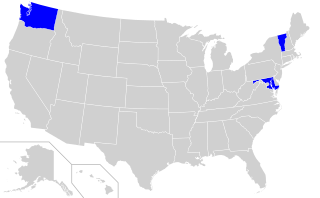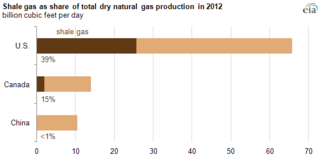Related Research Articles

The Goldman Environmental Prize is a prize awarded annually to grassroots environmental activists.

The ECOPEACE Party is a national environmentalist political party in South Africa founded in 1995. The party was formerly known as eThekwini ECOPEACE and eThekwini Ecoparty—eThekwini is the Zulu name for Durban, where the party is based. The Zulu party motto is Buhlakuleni uButhi, Yitshaleni iMithi, which translates to "Uproot Poisons, Replant Trees ".

Balcombe is a village and civil parish in the Mid Sussex District of West Sussex, England. It lies 31 miles (50 km) south of London, 16 miles (26 km) north of Brighton, and 32 miles (51 km) east-northeast of the county town of Chichester. Nearby towns include Crawley to the northwest and Haywards Heath to the south-southeast.

Fracking in the United States began in 1949. According to the Department of Energy (DOE), by 2013 at least two million oil and gas wells in the US had been hydraulically fractured, and that of new wells being drilled, up to 95% are hydraulically fractured. The output from these wells makes up 43% of the oil production and 67% of the natural gas production in the United States. Environmental safety and health concerns about hydraulic fracturing emerged in the 1980s, and are still being debated at the state and federal levels.

Shale gas is an unconventional natural gas that is found trapped within shale formations. Since the 1990s, a combination of horizontal drilling and hydraulic fracturing has made large volumes of shale gas more economical to produce, and some analysts expect that shale gas will greatly expand worldwide energy supply.
Gasland is a 2010 American documentary film written and directed by Josh Fox. It focuses on communities in the United States where natural gas drilling activity was a concern and, specifically, on hydraulic fracturing ("fracking"), a method of stimulating production in otherwise impermeable rock. The film was a key mobilizer for the anti-fracking movement, and "brought the term 'hydraulic fracturing' into the nation's living rooms" according to The New York Times.

Hydraulic fracturing is a well stimulation technique involving the fracturing of formations in bedrock by a pressurized liquid. The process involves the high-pressure injection of "fracking fluid" into a wellbore to create cracks in the deep rock formations through which natural gas, petroleum, and brine will flow more freely. When the hydraulic pressure is removed from the well, small grains of hydraulic fracturing proppants hold the fractures open.
Shale gas is an unconventional natural gas produced from shale, a type of sedimentary rock. Shale gas has become an increasingly important source of natural gas in the United States over the past decade, and interest has spread to potential gas shales in Canada, Europe, Asia, and Australia. One analyst expects shale gas to supply as much as half the natural gas production in North America by 2020.

Fracking in the United Kingdom started in the late 1970s with fracturing of the conventional and gas fields near the North Sea. It was used in about 200 British onshore oil and gas wells from the early 1980s. The technique attracted attention after licences use were awarded for onshore shale gas exploration in 2008. The topic received considerable public debate on environmental grounds, with a 2019 high court ruling ultimately banning the process. The two remaining high-volume fracturing wells were supposed to be plugged and decommissioned in 2022.

Fracking has become a contentious environmental and health issue with Tunisia and France banning the practice and a de facto moratorium in place in Quebec (Canada), and some of the states of the US.

The environmental impact of fracking is related to land use and water consumption, air emissions, including methane emissions, brine and fracturing fluid leakage, water contamination, noise pollution, and health. Water and air pollution are the biggest risks to human health from fracking. Research has determined that fracking negatively affects human health and drives climate change.
Cuadrilla Resources is an oil and gas exploration and production company founded in 2007. It is headquartered in Bamber Bridge, Lancashire, and has operations in the United Kingdom. The company intend to develop shale gas in the UK by using hydraulic fracturing. Its chairman is Roy Franklin, who is also deputy chairman of Equinor. Its chief executive is Francis Egan.

The anti-fracking movement is a political movement that seeks to ban the practice of extracting natural gasses from shale rock formations to provide power due to its negative environmental impact. These effects include the contamination of drinking water, disruption of ecosystems, and adverse effects on human and animal health. Additionally, the practice of fracking increases the amount of carbon dioxide released into the atmosphere, escalating the process of climate change and global warming. An anti-fracking movement has emerged both internationally, with involvement of international environmental organizations, and nation states such as France and locally in affected areas such as Balcombe, Sussex, in the UK. Pungești in Romania, Žygaičiai in Lithuania, and In Salah in Algeria. Through the use of direct action, media, and lobbying, the anti-fracking movement is focused on holding the gas and oil industry accountable for past and potential environmental damage, extracting compensation from and taxation of the industry to mitigate impact, and regulation of gas development and drilling activity.
Shale gas in the United Kingdom has attracted increasing attention since 2007, when unconventional onshore shale gas production was proposed. The first shale gas well in England was drilled in 1875. As of 2013 a number of wells had been drilled, and favourable tax treatment had been offered to shale gas producers.

The Balcombe drilling protest occurred when test drilling and possible fracking for petroleum were proposed in 2012 near Balcombe, a village in West Sussex England. Local residents protested and anti-fracking environmentalists in the UK made it a focus of attention. The drill pad is located in a wooded area known as Lower Stumble Wood.

Fracking in South Africa is an energy production strategy at early stages of development using high-pressure drilling techniques to release natural gas trapped in shale rock. After initially imposing a moratorium on fracking in April 2011, the South African government lifted the moratorium in September 2012 after an initial investigation by an interdepartmental task team. Several energy companies were subsequently granted exploration licenses. Fracking in South Africa is a current topic of debate, with proponents pointing to substantial economic and energy benefits and opponents voicing concerns about potentially adverse environmental impacts.

Ramesh Agrawal is an Indian social worker, internet café owner and grassroots environmentalist from Chhattisgarh, who is a founder of group Jan Chetana(जन चेतना, meaning people's consciousness). He was awarded the Goldman Environmental Prize in 2014 for his efforts in organizing protests against certain industrialization plans in the region, and in particular informing citizens about environmental and social consequences of projected large-scale coal mining.
As a legal document, the broad form deed severs a property into surface and mineral rights. This allows other individuals or organizations other than the land owners to purchase rights to resources below the surface. These parties also receive use of surface resources – such as wood or water – to facilitate gathering the resources below ground. Based on English legal theory but an American creation from the early 1900s, the broad form deed was used by land and coal companies in many states within the Appalachian Region.
Makoma Lekalakala is a South African activist who is the director of the Johannesburg branch of Earthlife Africa. Along with Liz McDaid, she was awarded the 2018 Goldman Environmental Prize for the African region for their work on using the courts to stop a Russian-South African nuclear deal in 2017.
Liz McDaid is a South African activist who is the "Eco-Justice Lead" for the Southern African Faith Communities' Environment Institute (SAFCEI). Along with Makoma Lekalakala, she was awarded the 2018 Goldman Environmental Prize for the African region for their work on using the courts to stop a Russian-South African nuclear deal in 2017. In 2018 McDaid and Lekalakala received the Nick Steele Memorial Award for their work in winning a crucial court case to halt plans by the South African government to proceed with a national nuclear build programme. McDaid is currently Head of Energy at Organisation Undoing Tax Abuse.
References
- ↑ "Prize Recipient, 2013 Africa. Jonathan Deal". Goldman Environmental Prize . Retrieved 7 December 2013.
- ↑ "Goldman Prize for South African anti-fracking activist Jonathan Deal". africanconservation.org. African Conservation Foundation. 21 April 2013. Archived from the original on 10 August 2022. Retrieved 25 April 2019.
- ↑ Reddall, Braden (15 April 2013). "South African 'fracktivist' awarded top U.S. environmental prize". in.reuters.com. Reuters. Archived from the original on 25 April 2019. Retrieved 25 April 2019.
- ↑ Gosling, Melanie (16 April 2013). "Why activist is the real Deal". Cape Times. Retrieved 25 April 2019.
- ↑ "Jonathan Deal". Safe citizen.
- ↑ "Jonathan Deal". Edubilla.com. Retrieved 15 April 2023.